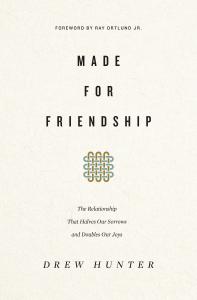Why don’t Christians think or write much about friendship? Aside from an obscure Medieval text and occasional asides in biographies and letters, there isn’t much by way of theologies of friendship out there. This lack is something that Evangelicals have set themselves to correct in the past few years. Books like The Company We Keep: In Search of Biblical Friendship, Befriend: Create Belonging in an Age of Judgment, Isolation, and Fear, How Should We Develop Biblical Friendship, and Side by Side: Walking with Others in Wisdom and Love have all appeared in the past few years. The most recent addition to this stream of books is Drew Hunter’s Made for Friendship.
In Made for Friendship, Hunter argues that this much-neglected relationship is one which we ought to both think about and practice. And we need to do both of these things in ways that are meaningful and Biblical, rather than silly and shallow (as most of our relationships are in the modern world). Specifically, true friendship is “forged between two people as they journey through life with openness and trust.” (pg 80).
Working with this definition, Made for Friendship 1) makes the case that friendship is necessary; 2) explains the marks of friendship; 3) explains how to “cultivate” friendship, and 4) explores a Biblical theology of friendship.

In shaping his Biblical theology, Hunter makes the argument that salvation and the Christian life may be understood in terms of friendship. Jesus is a friend of sinners. He died to save His friends and to restore us to fellowship with God. Eternity in heaven can be understood as an eternity of friendship, with God and man living in harmony. This is not to denigrate the Kingship of Christ, it is rather to highlight His condescension in stooping to become man and bear our sin, as well as His mercy in raising us up from our rebellion to the exalted and undeserved positions He has prepared for us in glory.
Overall, this book is excellent and I happily recommend it to you.
With that said, I think there are still some issues that need to be addressed not so much with Made for Friendship as a book, but with the concept of friendship itself.
For one, why has it taken so long for Christians to get around to the serious work of writing about friendship? I suspect it is because the Bible doesn’t actually have a lot to say about the topic. Sure, there are a handful of Proverbs on the subject; David and Jonathan are described as friends; and Jesus’ relating to His disciples and His people as “friends” are all there—but each of these only briefly and never in detail. Friendship does not receive the treatment of, say, justification or election or creation or, well, any number of other topics you would find in a standard systematic theology.
Instead, the category the Bible gives us is that of “Fellowship.” This is not the same thing as friendship, and in fact specifically does not require us to be “friends.” This is one of the things which makes Christianity distinct. Within the church, individuals may “fellowship” with each other who would never outside of the Gospel have been friends at all, and who may not even be friends within the Gospel union.
Don’t get me wrong, I think Hunter’s reading of the narrative of Scripture as being about the restoration of friendship is fine, and lines up well with some of the passages of and ideas in Scripture. And yet, I think it’s also not the primary narrative we see in Scripture—it’s certainly not as dominant as that of Christians as subjects or citizens of the Kingdom, for example. For that matter, I haven’t counted specifically, but I doubt friendship is even as dominant a theme as that of Christians as farmers (or “the farmed,” depending on which way we want to run with the narrative).
I’d have to think more about this before responding in detail as to why this is. But my gut reaction is that it is because “friendship” is not just “forged between two people as they journey through life with openness and trust.” It is forged between two people who are focused on the same thing. So yes, when two Christians are friends they ought to be focused on Christ.
But friendship, like marriage, is not just an institution for Christians. It is a common grace institution that even non-believers can participate in, or that believers can (and should!) participate in with non-believers. And while the Bible does have a category for common grace institutions (again, marriage is the primary example here), it does not deal extensively with them in and of themselves. Even when these institutions do make an appearance, they are used in the service of the primary relationship set up by God through Christ. So when Paul talks about marriage in Ephesians 5, the point isn’t to explain to us what marriage is. The point is to convey a truth about the relationship between Christ and His church and guide us in applying that truth in our own lives. Anything said about marriage is very nearly (but not quite) incidental. And even if it’s not quite incidental, it is at least a secondary point.
The same is even more true of friendship. Friends are friends because they have openness and trust on their journey to be sure, but they are also journeying somewhere and being open and trustworthy about something. So it may be that we have friendships based on a love of sports. Or movies. Or political causes. Or any number of things of varying degrees of quality. The point is, friendship does not require unity based around Christ. Which I suspect is why so little time and thought has been put into it by Christians. Fortunately, Drew Hunter has written an excellent book to help correct that and guide us in thinking well about what it means to be friends.
Dr. Coyle Neal is co-host of the City of Man Podcast and an Assistant Professor of Political Science at Southwest Baptist University in Bolivar, MO, where his friends are far more patient than he has any right to expect.













